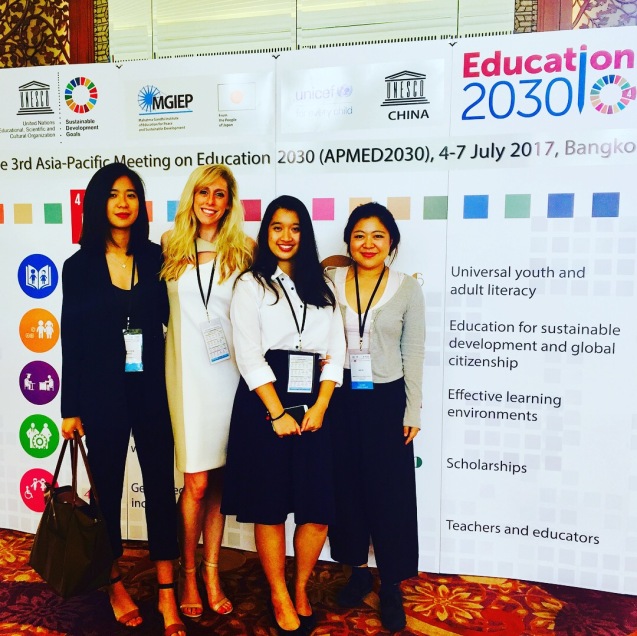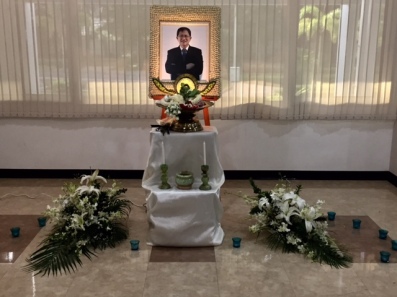“Travel is fatal to prejudice, bigotry and narrow-mindedness, and many of our people need it sorely on these accounts. Broad, wholesome, charitable views of men and things cannot be acquired by vegetating in one little corner of the earth all one’s lifetime.”
-Mark Twain
This quote came to mind as I reflect on the events taking place in Charlottesville from afar. While I always miss home and the values that America has historically represented worldwide, I have never been more grateful for the opportunity to immerse myself in a culture across the world and take time to learn about their values and beliefs. The UNESCO fellowship has allowed me to explore multiple cultures within the Southeast Asian context, which has in turn developed me personally and professionally. As with many of my experiences as a graduate student at GWU, I ponder about how different the mindsets of individuals would be if they had access to these types of life-changing immersion opportunities. The summer feels as if it is flying by as I wrap up my second month of the fellowship at UNESCO Bangkok! Since my last blog, I’ve familiarized myself with the city, begun to explore this beautiful country and have even become accustomed to the heat (as much as one can hope to, of course).
July was filled with a variety of initiatives for UNESCO Bangkok as a whole but a definite highlight was being involved in the logistical planning and execution of APMED 2030. The Asia Pacific Meeting on Education was focused on bringing all the key players in education (UNICEF, national commissions, ministries of education) throughout the region to discuss Sustainable Development Goal 4.7. A survey given at past APMED meetings revealed that member states and regional offices identified this part of the goal as a weakness in terms of implementation. Target 4.7 ensures that all learners acquire the skills needed to promote sustainable development through education, human rights, gender equality, global citizenship etc. It was inspiring to witness UNESCO’s critical power of convening as participants grappled with concerns and ideas regarding implementation via presentations, panels and small group brainstorming. Topics throughout the weeklong meeting included global citizenship education, peace and sustainable development and monitoring and evaluation of abstract concepts such as human rights curriculum. A theme throughout the conference was addressing the emerging gap between policy and practice and using teachers as the key to implementation through quality professional development. Hearing from representatives from different contexts (ex: Bangladesh versus Myanmar) regarding their varied approaches to implementation gave me hope for the future of global education and what can be accomplished through collaboration.

A major part of my fellowship this summer has been focused on independent research on successful case studies of ICT programming for migrant children and out-of-school populations, which could potentially be used for a UNESCO publication. Through this research, I have been able to connect with many different people (from various UNESCO teams to the US embassy) working on creative ways to integrate technology in the classroom, especially in terms of English language education. It is widely accepted that English has developed an undisputed global status as the language of communication in academic disciplines. As a result, in order for Thai students to have access to broad educational and employment opportunities, English language instruction in schools and through non-formal means must be a priority. UNESCO is committed to researching the best ways to accomplish these goals while maintaining mother tongue language instruction. Unfortunately, recent data proves that despite investment, with 17.6% of the Thai budget allocated to education, students are underperforming and falling behind. In the latest English proficiency assessment results, which were issued by English First and surveyed 950,000 adults in 72 countries, Thailand ranked 56th globally and 15th out of 19 countries in Asia. This demonstrates a steep decline in performance and highlights a need for literacy intervention at the K-12 level. A short weekend trip to Kuala Lumpur highlighted this deficit in my daily interactions and proved that the level of English capability in Malaysia is far beyond that of Thailand, demonstrating a need for additional research into where the gaps are occurring. The opportunity to travel to Ho Chi Minh City and present at the EdTech Asia conference allowed me to dive deeper and explore some of the innovative educational methods that are being used throughout Southeast Asia.

The EdTech Asia Summit is a yearly gathering of the most influential stakeholders in edtech entrepreneurship and innovation in the Asian region. The two day event focused on panel discussions and networking opportunities to highlight trends, challenges and critical areas of need in education that could potentially be met by inventive ideas and programming in the technology space. My presentation was included as part of a panel on Tech, Education, and Reduction of Inequality in Asia and I focused on the importance of teacher training in ICT programming to ensure quality versus just providing broad access. Speaking from my experience as an educator and implementing adaptive learning programs in my classroom, I was able to engage the audience (of mostly edtech industry individuals) on the topic of using the teacher as the facilitator of their product and the critical need for teacher voice in both the creation and implementation of tech programming. The industry professionals that I met with spoke of their want and need to engage with more educators to ensure the intended success of their products. Additionally, I was able to connect with varied partner CEOs with Teach for All, an organization that uses the Teach for America model and adjusts for implementation in their particular country context, and discuss the innovative work they are doing to engage stakeholders and develop monitoring and evaluation systems throughout Vietnam, Cambodia and Indonesia. The EdTech conference has been the highlight of my summer thus far and I feel grateful for the opportunity to engage with varied educational professionals in such an innovative environment. This week I will be heading to Chiang Rai, in the northern part of Thailand, to help a UNESCO colleague facilitate a teacher training while also visiting our pilot program schools. I will give an update on this experience in my next blog!
 Unfortunately, the UNESCO Bangkok office has been coping with the incredibly tragic and sudden death of our Director, Dr. Gwang- Jo Kim (known affectionately to our office as GJ). He was an influential person in international and comparative education through his reform initiatives in restructuring the Korean education system, his work as a Senior Education Specialist at the World Bank and his final post at UNESCO Bangkok. Our office has established a small yet beautiful memorial in his honor on the ground floor of our regional office, including hanging all the beautiful hand-crafted kites he made for staff over the years, and a larger memorial will be held in his memory at the end of August. My hope is that our office will carry on his tremendous legacy and drive to provide every child, regardless of where they are born or what their circumstances are, with a quality education.
Unfortunately, the UNESCO Bangkok office has been coping with the incredibly tragic and sudden death of our Director, Dr. Gwang- Jo Kim (known affectionately to our office as GJ). He was an influential person in international and comparative education through his reform initiatives in restructuring the Korean education system, his work as a Senior Education Specialist at the World Bank and his final post at UNESCO Bangkok. Our office has established a small yet beautiful memorial in his honor on the ground floor of our regional office, including hanging all the beautiful hand-crafted kites he made for staff over the years, and a larger memorial will be held in his memory at the end of August. My hope is that our office will carry on his tremendous legacy and drive to provide every child, regardless of where they are born or what their circumstances are, with a quality education.